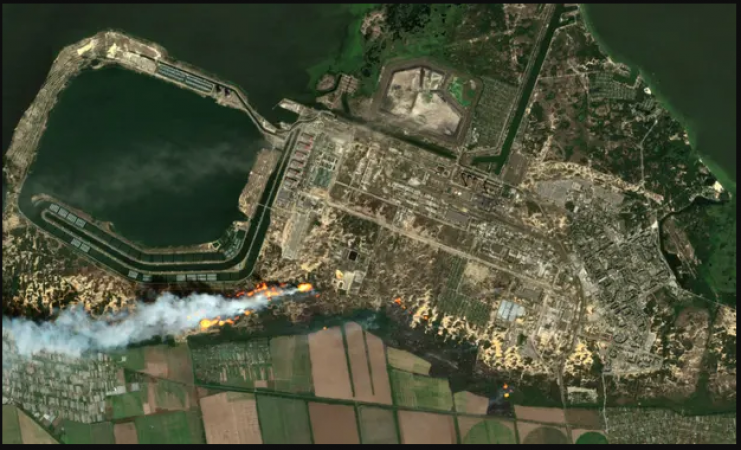
Ukraine: On Saturday, as both sides traded blame for recent shelling in the region, concerns remained about the potential for a radiation leak at Europe's largest nuclear power plant. Russia claimed that Ukrainian shells hit a nuclear-fueled structure, but Ukraine claimed that Russian forces fired on areas across the river from the plant.
Residents living close to the Zaporizhzhia nuclear power plant were being given iodine tablets by the authorities in case of radiation exposure, which could have negative health effects.
The cooling system for the nuclear reactors at the plant is a major source of concern. On Thursday the plant was temporarily shut down for what officials described as transmission line fire damage, which is essential for the system to function. Nuclear meltdown can be brought on by a faulty cooling system.
At the start of the six-month conflict, Russian forces captured the nuclear plant complex, but local Ukrainian workers have kept it operational. According to the Russian and Ukrainian governments, shelling has reportedly taken place in the complex and surrounding areas, raising fears of possible devastation.
According to Energotom, the operator of Ukraine's nuclear power plant on Saturday, the power plant infrastructure was damaged by repeated shelling. It warned that there was a high-risk fire and that radioactive material could leak and leak hydrogen.
According to Valentin Reznichenko, governor of Ukraine's Dnipropetrovsk region, the cities of Nikopol and Marhanet, which are both 10 kilometers (6 mi) from the plant across the Dnieper River, were hit by Russian Grad missiles and artillery shells.
However, Russian Defense Ministry spokesman Igor Konashenkov claimed that Ukrainian forces fired at the plant from Marhanets. According to him, 17 Ukrainian shells were fired at the plant in the last day, four of which hit the roof of a structure used to store nuclear fuel.
It was not possible to confirm any of the accounts immediately.
A deal has been attempted by the United Nations Atomic Energy Agency to send a team to inspect and assist with safety at the plant. Although officials claimed that the travel plans were in motion, a possible date for the same was still unknown.
According to Ukrainian President Volodymyr Zelensky, the presence of the International Atomic Energy Agency at the plant is important, in order to keep it "under permanent Ukrainian control".
In his weekly address on Friday, Zelensky said the situation was still volatile and dangerous. "If the events of [Thursday] are repeated, the station will once again be one step away from disaster, that is, if Russia takes steps that could shut down reactors or disconnect the station from the grid."
According to Ukraine, Russia is reportedly storing weapons at the power plant and launching attacks from its vicinity as a form of defence. Moscow, on the other hand, claims that Ukraine fired on the nuclear complex.
Russia blocked agreement on the final document of a four-week review of the UN treaty, which is considered a cornerstone of nuclear disarmament, late Friday because of a dispute over the plant. The Russian takeover of the Zaporizhzhya plant was criticized in the draft document of the Convention to Review the Nuclear Non-Proliferation Treaty.
The conference was turned into "a political hostage", according to the deputy head of the Russian delegation, who were trying to settle scores with "Russia by raising issues that are not directly related to the treaty".
According to local officials, one person was killed and another was injured in Russian firing in the Mykolaiv region of Ukraine. An important Black Sea port and center for shipbuilding is Mykolayiv City.
According to the governor of the Eastern Donetsk region, Pavlo Kirilenko, Russian forces opened fire on the city of Bakhmut on Saturday, killing two people. Bakhmut is a major target for Russian and separatist forces seeking to capture parts of the region they do not already control.
On Saturday, the British government announced it was providing Ukraine with underwater drones and training sailors to use to clear mines off the devastated nation's coast.
Mines planted in the Black Sea during the conflict have made it difficult for Ukraine to export grain by sea to overseas markets, but a July agreement allowed shipments to resume along a corridor.
According to the United Nations, more than 1 million metric tons of Ukrainian food has been shipped since early August as part of the Black Sea Grains Agreement.
The World Food Program was able to restart wheat purchases from Ukraine for drought-stricken countries such as Ethiopia and Yemen, thanks to an influx of grain under the agreement, which has reduced prices and the potential for food insecurity.
UK PM slams Russia's 'cultural vandalism' in Ukraine
Kiev cuts the last power line to Zaporozhye NPP, leaving Ukraine without a way to get electricity
Putin orders an increase in Russian military strength of 137,000 amid the conflict in Ukraine